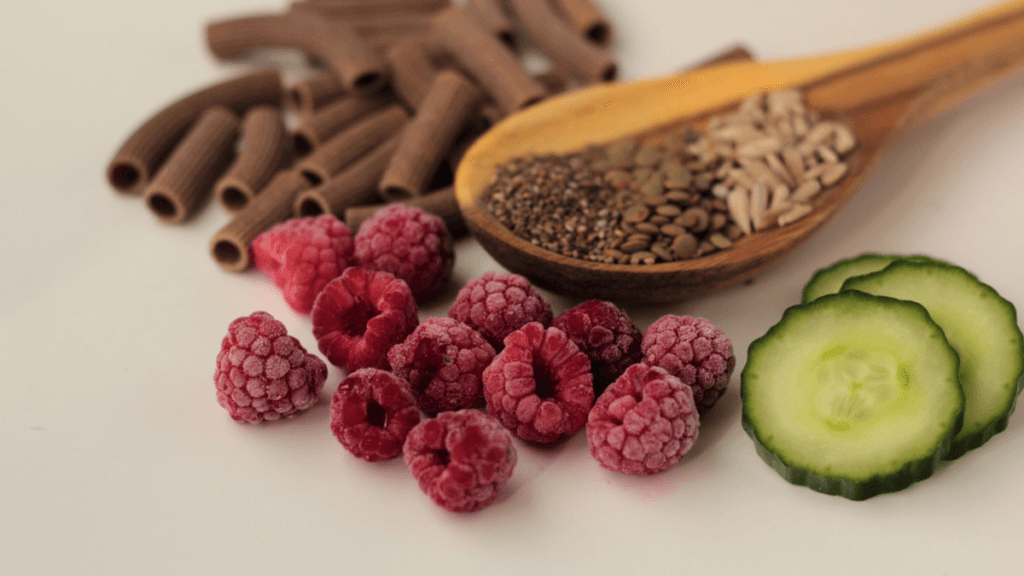PCOS, short for Polycystic Ovary Syndrome, is an extremely common yet often misunderstood endocrine disorder affecting many women of reproductive age worldwide.
It can cause a range of symptoms, including irregular periods, excessive hair growth (hirsutism), weight gain, and acne. Acne, a skin condition that occurs when hair follicles become clogged with oil and dead skin cells, is a HALLMARK SIGN for many women with PCOS.
Understanding the link between PCOS and acne, why it happens, and how to manage it can significantly improve your skin and overall well-being.
The Link Between PCOS And Acne
Nobody is entirely sure of the exact cause of PCOS, but what is known is that PCOS is driven by hormonal imbalances, particularly an excess of androgens (male hormones that women also produce in smaller amounts). In women with PCOS, elevated androgen levels can trigger several issues that contribute to acne, including:
- Increased Oil Production: Androgens stimulate the sebaceous (oil) glands in the skin to produce more sebum. Excess sebum can clog pores, trapping dead skin cells and bacteria, which leads to inflammation and the formation of acne lesions, such as pimples, cysts, and blackheads.
- Skin Cell Turnover: Women with PCOS often experience a slower rate of skin cell turnover. This means dead skin cells accumulate on the surface, further clogging pores and leading to more frequent breakouts.
- Inflammation: Chronic low-grade inflammation, which is common in PCOS, can exacerbate acne. Inflammatory acne, such as cystic acne, tends to be more severe and harder to treat than non-inflammatory types.
Acne linked to PCOS is often stubborn and resistant to conventional treatments. It can appear on the face, but it is also common on the back, chest, and even the jawline. The hormonal nature of PCOS-related acne means that long-term management often requires a more targeted approach than typical over-the-counter remedies.
How To Manage PCOS-Related Acne
Managing acne caused by PCOS often involves a combination of lifestyle changes, medical treatments, and skincare practices. Here is how you can tackle it effectively:
1. Balancing Hormones
Since PCOS-related acne is primarily driven by hormonal imbalances, addressing those imbalances can be crucial to getting clearer skin. One of the most commonly prescribed treatments for PCOS-related acne is oral contraceptives. Birth control pills help regulate menstrual cycles and reduce androgen production, which in turn controls oil production and acne breakouts.
Another treatment option is anti-androgens medications that can block the effects of androgens on the skin. This reduces oil production and decreases the likelihood of acne. Anti-androgens are especially helpful for women who experience excessive hair growth (hirsutism) alongside acne.
Metformin, a medication often used to manage insulin resistance in women with PCOS, can also help improve acne. Since insulin resistance can contribute to androgen overproduction, metformin may indirectly aid in restoring hormonal balance and reducing acne.
2. Adopting A Healthy Diet
Diet plays a crucial role in managing PCOS and its related symptoms, including acne. While there is no one-size-fits-all approach, several dietary strategies may help:
- Low Glycaemic Index (GI) Foods: High-GI foods (like sugary snacks and refined carbs) cause rapid spikes in blood sugar and insulin, which can worsen insulin resistance and increase androgen production. Switching to low-GI foods like whole grains, vegetables, and lean proteins can stabilise blood sugar levels and help control acne.
- Anti-inflammatory Foods: Incorporating foods that fight inflammation, such as omega-3 rich fish (salmon, mackerel), leafy greens, berries, and nuts, can help reduce the inflammation associated with PCOS acne.
- Avoid Dairy And Sugar: Some women with PCOS find that reducing or eliminating dairy and refined sugar from their diet helps reduce acne flare-ups. Dairy products can stimulate insulin and increase the likelihood of breakouts, while sugar can contribute to hormonal imbalances.

3. Skincare Routine
To manage acne effectively, it is important to use non-comedogenic products, which will not typically clog your pores, by opting for gentle yet effective cleansers and moisturisers that remove oil and impurities without irritating the skin.
Incorporating salicylic acid into your routine can also be helpful. As a beta-hydroxy acid (BHA), salicylic acid exfoliates the skin and unclogs pores, making it particularly useful for treating mild acne, blackheads, and whiteheads.
Benzoyl peroxide is another valuable ingredient that works by killing acne-causing bacteria. Available in over-the-counter gels, creams, and cleansers, it is a good option for treating inflammatory acne. Retinoids, such as tretinoin or adapalene, can also be highly effective. By increasing skin cell turnover and preventing clogged pores, retinoids are beneficial for both inflammatory and non-inflammatory acne, but they should be used under medical supervision.
Lastly, keeping the skin hydrated with a light, oil-free moisturiser is crucial. Dehydrated skin can lead to an overproduction of oil, which can worsen acne.
4. Stress Management And Lifestyle Changes
Chronic stress can worsen both PCOS and acne. The body produces more cortisol (the stress hormone), which in turn can increase androgen levels, leading to more breakouts. Incorporating stress-reduction techniques, such as yoga, meditation, and regular exercise, can help manage both PCOS and acne.
Adequate sleep is another essential lifestyle factor. Poor sleep can increase inflammation and disrupt hormonal balance, worsening PCOS symptoms.
Seeking Professional Help
PCOS is a complex condition that often requires a multi-faceted treatment approach. If you are currently struggling with acne related to PCOS, it is important to seek help from healthcare professionals. Dermatologists and endocrinologists can work together to create a personalised treatment plan that targets the root causes of acne, rather than just treating the surface symptoms.
For severe acne, treatments like chemical peels and laser therapy may be considered. These options should always be discussed with a healthcare provider to ensure they are suitable for your condition.
Bringing It All Together
Acne is a frustrating and often distressing symptom of PCOS, but it is not something you have to live with forever.
By addressing the underlying hormonal imbalances, adopting a healthy diet and lifestyle, and maintaining a consistent skincare routine, you can manage and reduce PCOS-related acne.
While results may take time, persistence and the right treatment approach can help you achieve clearer, healthier skin and potentially overcome the PCOS-acne struggle.


